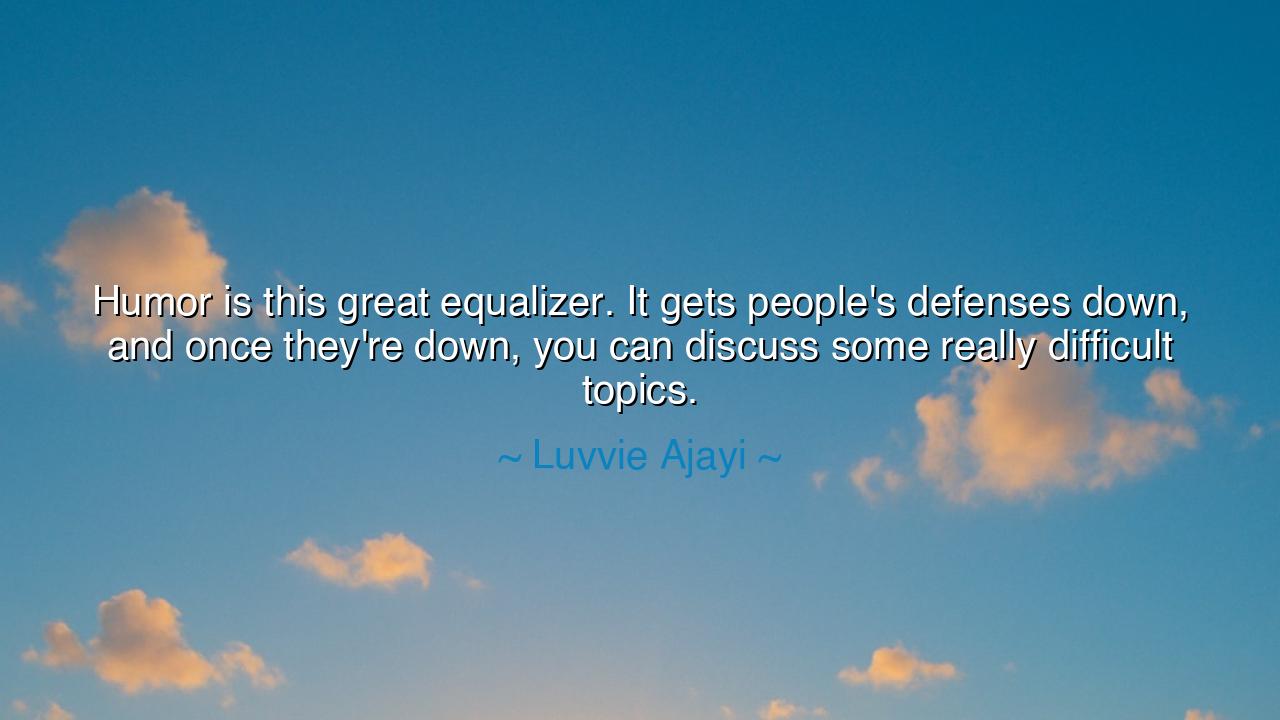
Humor is this great equalizer. It gets people's defenses down
Humor is this great equalizer. It gets people's defenses down, and once they're down, you can discuss some really difficult topics.






“Humor is this great equalizer. It gets people’s defenses down, and once they’re down, you can discuss some really difficult topics.”
Thus spoke Luvvie Ajayi, a voice of truth and laughter, who wields wit not as a weapon of mockery but as a bridge between hearts. In these words, she unveils one of the oldest and most profound powers known to humankind — the sacred art of humor, which softens pride, dissolves fear, and opens the gates of understanding. Her teaching is both modern and eternal, for the wise of every age have known that laughter is not the enemy of truth, but its messenger. When the spirit laughs, the heart listens, and when the heart listens, wisdom may enter.
To call humor an equalizer is to honor its power to dissolve the barriers of rank, race, and pride. A king and a beggar may stand worlds apart in status, but when both laugh, they become the same. The peal of laughter erases titles, and in that moment, all are merely human — fragile, foolish, and divine. Ajayi’s insight reminds us that the spirit of equality does not always begin in protest or proclamation; it often begins in shared laughter, in the recognition of our common absurdities. Through humor, the walls of division — built of ego and fear — crumble, and souls, once distant, draw near.
When she says humor “gets people’s defenses down,” she speaks of a transformation of the heart. For when one is guarded, truth cannot enter. Logic and persuasion may batter the walls, but laughter slips through unnoticed — it disarms without wounding. This is why the greatest orators, prophets, and philosophers have all used humor to reach the unreachable. The teacher who mocks himself earns the ear of the skeptic; the leader who smiles in honesty calms the anger of the crowd. Humor is no trick of language, but a revelation of humility — a reminder that wisdom without warmth is tyranny, and truth without tenderness is cruelty.
In ancient times, even the sternest of sages understood this. Socrates, famed for his questions, was also known for his irony — a gentle mockery that exposed folly without hatred. He used humor to awaken minds rather than humiliate them, to guide others toward truth by letting them laugh at their own pretenses. His “Socratic irony” was a sacred form of jest — for he knew that laughter can lead where argument cannot. Likewise, Ajayi teaches that the most difficult topics — injustice, fear, and pain — can only be faced when laughter has opened the soul. For humor does not erase the wound; it prepares the heart to heal it.
In our own age, we see the same principle embodied in figures like Nelson Mandela, who endured long years of captivity yet emerged with laughter still on his lips. His humor did not deny his suffering — it transcended it. When he joked with his captors, he transformed enemies into men, and through laughter, began the slow work of reconciliation. He knew, as Ajayi knows, that laughter restores dignity to those who have been silenced, and makes truth bearable to those who fear it. Humor becomes, in this way, both shield and sword — shielding the wounded from despair, and cutting through the arrogance of power.
To use humor rightly, however, is an act of virtue. For humor can destroy as easily as it can heal. It must be rooted in empathy, not cruelty; in truth, not scorn. Ajayi’s words remind us that humor must always serve the higher good — not to mock weakness, but to reveal wisdom. The one who laughs at others builds walls; the one who laughs with others builds bridges. And so, the true humorist is not merely a jester, but a healer — one who eases the burdens of the heart by reminding it of its shared humanity.
So, let this be the teaching drawn from her words:
-
Use humor as a bridge, not a weapon. Let it bring hearts together, not drive them apart.
-
Laugh with humility, for laughter that begins in pride ends in cruelty.
-
Speak truth through laughter, for jest may enter where judgment cannot.
-
Remember that laughter reveals equality, reminding both the mighty and the meek of their shared mortality.
Thus spoke Luvvie Ajayi, and through her, the ancient wisdom finds a new voice. For she teaches that humor is not escape but encounter, not distraction but revelation. It is the torch that lights dark rooms, the song that makes pain bearable, the language that unites even those divided by fear. To laugh wisely is to love bravely. And so, O seeker of truth, let your laughter be kind, your wit be just, and your heart be open — for in laughter rightly used lies the first step toward understanding, and in understanding, the beginning of peace.






AAdministratorAdministrator
Welcome, honored guests. Please leave a comment, we will respond soon